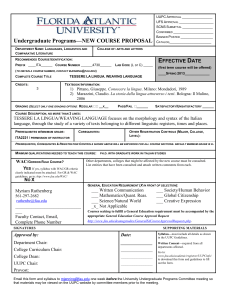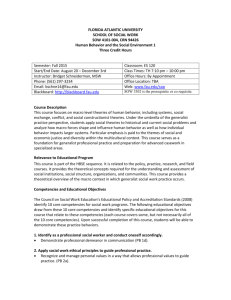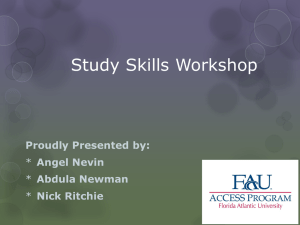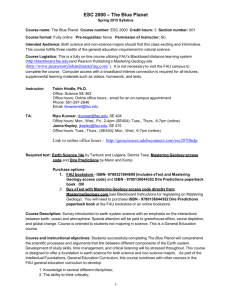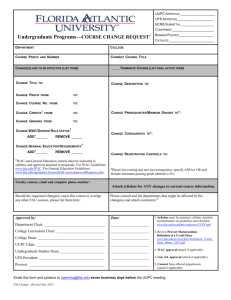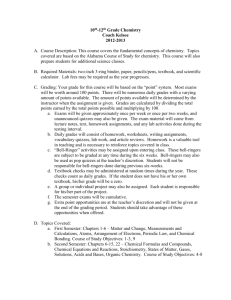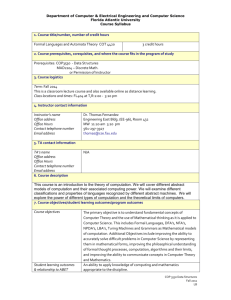Syllabus - Florida Atlantic University
advertisement
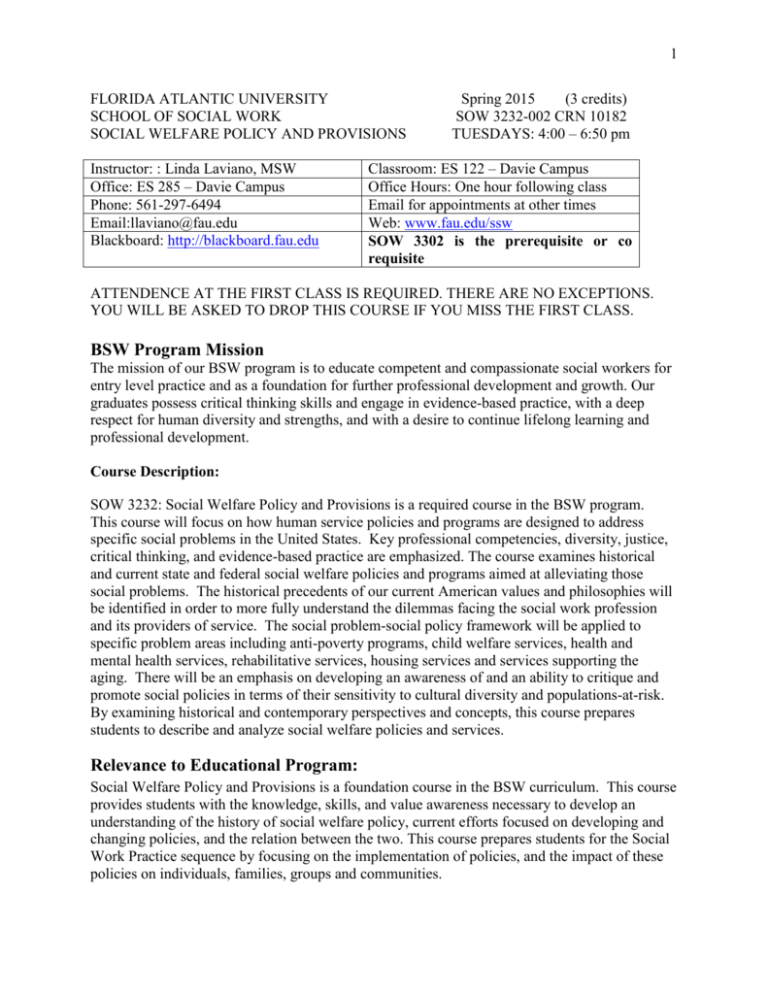
1 FLORIDA ATLANTIC UNIVERSITY SCHOOL OF SOCIAL WORK SOCIAL WELFARE POLICY AND PROVISIONS Instructor: : Linda Laviano, MSW Office: ES 285 – Davie Campus Phone: 561-297-6494 Email:llaviano@fau.edu Blackboard: http://blackboard.fau.edu Spring 2015 (3 credits) SOW 3232-002 CRN 10182 TUESDAYS: 4:00 – 6:50 pm Classroom: ES 122 – Davie Campus Office Hours: One hour following class Email for appointments at other times Web: www.fau.edu/ssw SOW 3302 is the prerequisite or co requisite ATTENDENCE AT THE FIRST CLASS IS REQUIRED. THERE ARE NO EXCEPTIONS. YOU WILL BE ASKED TO DROP THIS COURSE IF YOU MISS THE FIRST CLASS. BSW Program Mission The mission of our BSW program is to educate competent and compassionate social workers for entry level practice and as a foundation for further professional development and growth. Our graduates possess critical thinking skills and engage in evidence-based practice, with a deep respect for human diversity and strengths, and with a desire to continue lifelong learning and professional development. Course Description: SOW 3232: Social Welfare Policy and Provisions is a required course in the BSW program. This course will focus on how human service policies and programs are designed to address specific social problems in the United States. Key professional competencies, diversity, justice, critical thinking, and evidence-based practice are emphasized. The course examines historical and current state and federal social welfare policies and programs aimed at alleviating those social problems. The historical precedents of our current American values and philosophies will be identified in order to more fully understand the dilemmas facing the social work profession and its providers of service. The social problem-social policy framework will be applied to specific problem areas including anti-poverty programs, child welfare services, health and mental health services, rehabilitative services, housing services and services supporting the aging. There will be an emphasis on developing an awareness of and an ability to critique and promote social policies in terms of their sensitivity to cultural diversity and populations-at-risk. By examining historical and contemporary perspectives and concepts, this course prepares students to describe and analyze social welfare policies and services. Relevance to Educational Program: Social Welfare Policy and Provisions is a foundation course in the BSW curriculum. This course provides students with the knowledge, skills, and value awareness necessary to develop an understanding of the history of social welfare policy, current efforts focused on developing and changing policies, and the relation between the two. This course prepares students for the Social Work Practice sequence by focusing on the implementation of policies, and the impact of these policies on individuals, families, groups and communities. 2 There is also a relationship between this course and the Human Behavior and Social Environment sequence by providing students with an understanding of environmental social-economic factors on the well-being of people and through an emphasis on needs assessment and common human needs. An additional relationship exists with the Research Methods Course, by examining policy analysis and program evaluation. This course prepares beginning practitioners to understand the relationship between social problems, programs, and social agencies that are established to assist those in need. Finally, the basic practice competencies achieved in this course will prepare students for their courses on field education, practice with individuals, families and groups and with organizations and communities. Competencies and Education Objectives The Council on Social Work Education’s Educational Policy and Accreditation Standards (2008) identify 10 core competencies for social work programs. The following educational objectives draw from these 10 core competencies and identify specific educational objectives for this course that relate to these competencies (each course covers some, but not necessarily all of the 10 core competencies). Upon successful completion of this course, students will be able to demonstrate these practice behaviors. 1. Identify as a professional social worker and conduct oneself accordingly. Advocate for clients access to the services of social work (PB 1a).1 2. Apply social work ethical principles to guide professional practice. Tolerate ambiguity in resolving ethical conflicts (PB2c) 3. Apply critical thinking to inform and communicate professional judgments. Distinguish, appraise, and integrate multiple sources of knowledge, including researchbased knowledge and practice wisdom to inform policy practice (PB 3a). Demonstrate effective oral and written communication in working with policy (PB 3c). 4. Engage diversity and difference in practice. Recognize the extent to which a culture’s structures and values may oppress, marginalize, alienate, or create or enhance privilege and power (PB 4a). 5. Advance human rights and social and economic justice. Understand the forms and mechanisms of oppression, including discrimination based on age, race, ethnicity, religion, sexual orientation, immigration status, sexual identity, and expression (PB 5a). Advocate for human rights and social and economic justice (PB5b) Engage in practices that advance social and economic justice (PB5c) 6. Engage in research-informed practice and practice-informed research. Use research evidence to inform policy practice (PB 6b). PB – stands for “practice behavior” and refers to one of the 42 practice behaviors listed in the core social work competencies identified by the Council on Social Work Education. In order to ensure that students are able to develop and demonstrate these competencies, each practice behavior is incorporated into course content, assignments, tests, class activities, and evaluation. 1 3 7. Apply knowledge of human behavior and the social environment. Utilize conceptual frameworks to guide the processes of assessment, intervention, and evaluation of policies (PB 7a). 8. Engage in policy practice to advance social and economic well-being and to deliver effective social work services. Analyze, formulate, and advocate for policies that advance social well-being (for clients and community) (PB8a) Collaborate with colleagues and clients for effective policy action (for clients and community) (PB8b) 9. Respond to contexts that shape practice. Continuously discover, appraise, and attend to changing locales, populations, scientific and technological developments, and emerging societal trends to provide relevant services, including issues related to immigration, poverty, aging, and health disparities (PB 9a). Provide leadership in promoting sustainable changes in service delivery and practice to improve the quality of social services (PB9b). 10. Engage, assess, intervene, and evaluate with individuals, families, groups, organizations, and communities. Intervention: Negotiate, mediate, and advocate for individual clients (PB 10k). Evaluation: Critically analyze, monitor, and evaluate interventions with individuals (PB 10m). Teaching Methodologies: The course objectives shall be accomplished through the instructor’s provision of a variety of teaching methods, including lectures, class discussion, reading and writing assignments, video presentations, guest speakers, and individual and group activities. Course Assignments and Grading: 1. 2. 3. 4. 5. 6. 7. 8. Find Your Representative Assignment Legislative Brief Newspaper Article/ Current Event Letter to the Editor Program/Policy Analysis Paper Participate in a Political Event Mid Term Exam Final Exam Course Assignments 5% 20 % 10 % 10 % 30 % 5% 10 % 10 % 4 Written assignments must be typed, double-spaced in 12-point font and include complete and accurate APA citations when required, 1) Find Your Representative Students will be instructed in class on how to locate and contact elected officials regarding policy issues. Documentation will be completed and turned in for credit. Due: January 20th [PBs 10a, 10k] 2) Legislative Brief Students will be expected to complete a two page fact sheet on a current US, state, or local legislative proposal. Outline will be reviewed in class. Brief should include 3 scholarly reference sources. Due: March 10th [PBs 3a, 3c, 5b, 5c, 8a, 8b, 9b, 10k, 10m] 3) Newspaper Article/Current Event Students will be expected to read newspapers in order to track current policy issues. Issues will be discussed in class weekly. Each student will sign up for a date to present a newspaper article in class and lead a discussion group. The topic of the article must relate to the assigned chapter reading for the week. A one page analysis on the article is due on the day of the presentation. Students are expected to follow the assignment guidelines as reviewed in class and posted on Blackboard. Due: according to sign up list in class. [PBs 3c, 4a, 8a, 9a, 4) Letter to the Editor Students will respond to a newspaper article in the form of a letter to the editor. Article should be on a particular policy area or piece of legislation that, either the US Congress, a state legislature or a local city council is considering. Turn in a copy of the letter submitted for credit. Submission to the newspaper is required, publication is not. Due: No Later than March 24th [PBs 2c, 3a, 3c, 4a, 5a, 5b, 5c, 8a, 8b, 9b, 10k, 10m] 5) Program/Policy Analysis Paper. Students will select a policy topic or program from the textbook and write a comprehensive research and analysis paper covering the following areas: type of policy and level at which the student is analyzing it (federal, state or local), intended target population of the policy, brief history of the policies intended to address this problem, policy alternatives, policy consequences and constraints. Students will critique the policy in relation to social work values and ethics. Guidelines for this paper will be reviewed in class. The written APA paper portion of this assignment will be 5 pages in length. Due: April 7th [PBs 1a, 3a, 3c, 5b, 5c, 6b, 7a, 8a, 8b, 10m] 6) Participate in a Political Event Students will be expected to participate in one political event in the community – a demonstration, rally, march, city council, county commission, or school board meeting, candidate rally, political party meeting, or other event (pending instructor approval). 5 Students will report to class verbally on events attended, who spoke at the event, who was present, what points of view were presented? Did your views change as a result of what you observed and heard? Due: No Later than April 14th. Participation in NASW “Lobby Day” will meet the requirement for this assignment. [PBs 1c, 1d, 3c, 4a, 5a, 8b] 7) Mid-term Examination-The examinations will cover the content of the lectures, videos, class discussions, and assigned readings (textbook mainly) for the half of the semester preceding each examination. The examinations will consist of objective multiple choice, true/false questions, and matching. In class: February 17th [PBs 3a, 9a] 8) Final Examination- The examinations will cover content of the lectures, videos, class discussions, and assigned readings (textbook mainly) for the half of the semester preceding each examination. The examinations will consist of objective multiple choice, true/false questions, and matching. In class: April 29th [PBs 3a, 9a] The grading scale for this course is as follows: 93 – 100% = A 90 – 92% = A87 – 89% = B+ 83 – 86% = B 80 – 82% = B77 – 79% = C+ 73 – 76% = C 70 – 72% = C67 – 69% = D+ 63 – 66% = D 60 – 62% = D0 – 59% = F Professional Expectations of Student Behavior The Florida Atlantic University School of Social Work is mandated by the Council on Social Work Education (www.CSWE.org) to foster and evaluate professional behavioral development for all students in the social work program. The School of Social Work also bears a responsibility to the community at large to produce fully trained professional social workers who consciously exhibit the knowledge, values, and skills of the profession of social work. The values of the profession are codified in the NASW Code of Ethics. Given this context, all students in the social work program will be expected to exhibit the following ethical standards of behavior. 1. Accountability: Attend class, arrive on time, and return from break in a timely manner. Participate in group activities and assignments at a comparable level to peers. 6 Complete work in a timely fashion and according to directions provided. Come to class prepared, with readings and other homework completed. 2. Respect: Treat all your peers, your instructors and all those you come in contact with, with dignity and respect at all times. Listen while others are speaking. Give feedback to peers in a constructive manner. Approach conflict with peers or instructors in a cooperative manner. Use positive and nonjudgmental language. 3. Confidentiality: Treat any personal information that you hear about a peer or an instructor as strictly confidential. Maintain any information shared in class, dyads or smaller groups within that unit. Use judgment in self-disclosing information of a very personal nature in the classroom. (Class time should not be used as therapy or treatment. If students feel the need to talk about issues they are struggling with, they many consult with their instructor to receive a referral for counseling.) Never use names of clients or disclose other identifying information in the classroom. 4. Competence: Apply yourself to all your academic pursuits with seriousness and conscientiousness, meeting all deadlines as given by your instructors. Constantly strive to improve your abilities. Come to class with books, handouts, syllabus, and pens Seek out appropriate support when having difficulties to ensure success in completing course requirements. Take responsibility for the quality of completed tests and assignment. Strive to work toward greater awareness of personal issues that may impede your effectiveness with clients. 5. Integrity: Practice being honest with yourself, your peers, and your instructors. Constantly strive to improve your abilities. Academic: Commit yourself to learning the rules of citing other’s work properly. Do your own work and take credit only for your own work. Acknowledge areas where improvement is needed. Accept and benefit from constructive feedback Submission of Papers: Students will submit their written assignments electronically. Electronic copies will be subject to plagiarism analysis and will be kept in electronic file for future reference. A student may not submit the same paper, or essentially the same, paper, project, assignment, or finished project to an instructor, which has been submitted to another instructor, unless specifically authorized by both instructors to do so. 6. Diversity: Strive to become more open to people, ideas, and creeds that you are not familiar with. Embrace diversity. Maintain speech free of racism, sexism, heterosexism, or stereotyping. Exhibit a willingness to serve diverse groups of persons. 7 Demonstrate an understanding of how values and culture interact. 7. Communication: Strive to improve both verbal and written communication skills as these skills are used heavily in interactions with clients and peers and also with creating client records. Demonstrate assertive communication with peers and instructors. Practice positive, constructive, respectful and professional communications skills with peers and instructor, including body language, empathy, and listening. 8. Social Justice: Strive to deepen your commitment to social justice for all populations at risk. Demonstrate an understanding of how institutional and personal oppression impede the experience of social justice for individuals and groups. Strive to learn about methods of empowering populations and enhancing social justice at micro, mezzo, and macro levels. Consequences of Unacceptable Behavior The School of Social Work may terminate a student’s participation in the program on the basis of professional non-suitability if the School’s faculty members determine that a student’s behavior has constituted a significant violation or pattern of violations of the NASW Code of Ethics, the FAU School of Social Work Student Manual, or the FAU Academic Policies and Regulations. Examples of violations that may lead to termination include (but are not limited to) the following: 1. Failure to meet or maintain academic grade point requirements as established by the University and the Social Work program. 2. Academic cheating, lying, or plagiarism. 3. Behavior judged to be in violation of the NASW Code of Ethics. 4. Failure to meet generally accepted standards of professional conduct, personal integrity, or emotional stability requisite for professional practice. 5. Inappropriate or disruptive behavior toward colleagues, faculty, or staff (at the School or in the field placement). 6. Consistent failure to demonstrate effective interpersonal skills necessary for forming professional relationships (for example, unable to demonstrate nonjudgmental attitude or unable to allow client self-determination). 7. Documented evidence of criminal activity occurring during the course of study. For additional university-wide policies and regulations see the FAU Catalog. This website contains information on grading, incomplete grades, cheating on exams, plagiarism, expectations of student behavior, and communication devices (e.g. cell phones to be disabled during class sessions). Policy on Makeup Tests and Late Assignments Assignments are to be turned in at the beginning of class on the due date. Late work will be penalized. Five points will be deducted for assignments that are not turned in at the beginning of class and two additional points will be deducted for every hour that the assignment is late. After the due date, no late assignments will be accepted unless the student has provided a medical 8 excuse or other documented emergency situation. There will be no make-up tests. Students who anticipate missed work due to participation in University approved activities or religious observances, must contact me in advance to allow time for reasonable accommodations to be made. Safe Assign Students agree that by taking this course all required papers may be subject to submission for textual similarity to review to SafeAssign for the detection of plagiarism. All submitted papers will be included as source documents in the SafeAssign reference database solely for the purpose of detecting plagiarism of such papers. Class Attendance and Participation Social work education is designed to help students prepare for professional practice. In order to model ethically appropriate practice, please treat coming to classes as you would treat working at an agency. Given the Council on Social Work Education’s requirements for professional behavior, attendance for all classes is required. More than one unexcused absence, excessive tardiness, or patterns of leaving early may result in a reduction of the final grade. Students may be asked to present a written excuse from a healthcare provider for excused absences due to illness or other documentation for other circumstances. Since participating in class is an integral part of social work education, it is vital that the student be in class; therefore, even with excused absences, the student may be required to withdraw or retake the class. If a student misses more than 2 classes – whether or not there is a documented, excused absence – the student may receive a substantial decrease in the final grade. As per FAU policy, attendance at the first class is mandatory. If a student misses the first class, that student may be asked to withdraw from the course and re-register in a future term. Policy on Use of Technology, Cell Phones, and Recording Devices in the Classroom The School of Social Work prohibits the use of cell phones, beepers, computers, audio recording, or video recording devices during instructional activities in classrooms, laboratories, and studios without the expressed written consent of the instructor. This prohibition does not apply to specific accommodations approved by the FAU Office for Students with Disabilities. When the instructor's consent is given, the materials produced are for personal use only and are not for distribution or sale in any fashion. Textbook DiNitto, D. (2011). Social welfare: Politics and Public Policy, 7th ed., Boston, MA: Pearson. ISBN 0-205-79384-3 Please be sure to get the latest edition of the textbook. Earlier editions are not acceptable for this course. A copy of the textbook has been placed on hold at the UC Library in Davie. Textbook is available in the bookstore or from online sellers or textbook rental companies. The online version of the textbook cannot be used in class, as it conflicts with the School of Social Work policy on the use of technology in the classroom. In addition to the textbook 9 students will be expected to read newspapers in order to track current Congressional and state policy issues. The New York Times is a good newspaper for reading about policy (pick up a daily 2-3 times a week) but other national papers will be fine as well-Washington Post, USA Today, LA Times, etc. Also pick up a local paper two to three times a week, as we will be tracking Florida State legislation. Instructor may provide additional supplemental readings. Also, please visit the Blackboard Web site for this course at http://blackboard.fau.edu for additional information. IMPORTANT: Blackboard uses the email addresses assigned to you by FAU – since you probably do not pick up email from the FAU account; you need to forward your email to the email address that you generally use. Log onto MyFAU (http://myfau.fau.edu) and forward your email to the email address that you want all Blackboard and other FAU email directed to… and if your email address changes, remember to change the forwarding in MyFAU. If you are experiencing problems logging onto MyFAU or Blackboard, you can contact the helpdesk at 561.297.3999. COMMUNICATING PROFESSIONALLY VIA EMAIL: Students are expected to behave and act in a professionally at all times. Therefore, it is expected that students write in a professional manner as well. All emails are required to have the following components if they are to be read by the instructor: 1) a clear and specific subject identifying yourself and the reason for the email; 2) within the text of the email address the instructor as "Dear Professor________"; 3) write a clear message using a professional vocabulary, clearly identifying and explaining the purpose of the email; 4) finish the email in a professional way using "Sincerely" or similar wording; and 5) always write your name and last name below the expression used in #4. Course Outline and Reading Assignments: The following outline of topics and readings may change as the course progresses, given student interests and needs. Please read the required readings prior to the class when we will be discussing them. Class Week 1: January 6th Topics Syllabus /Course Assignments Getting to know one another Readings/Assignments Due Read Introduction section of textbook Pages 1-12. Posted on Blackboard. Introduction to Reading Newspapers What is Policy? Why Study Policy? Week 2: January 13th Review of American Govt. Politics and the Policy making Read Chapter 1 10 process Week 3: January 20th How to find your representatives How to do Policy Research Turn in Find Your Representative Assignment Chapter 2 Read Chapter 2 Review Legislative Brief Assignment Guidelines Week 4: January 27th Politics and the History of Social Welfare Policy Read Chapter 3 Review Program/Policy Analysis Paper Guidelines Week 5: February 3rd Poverty: Definitions and Measures Read Chapter 4 Week 6: February 10th Preventing Poverty: Social Insurance Programs Read Chapter 5 Week 7: February 17th Mid-term Examination [PBs 3a, 9a] Week 8: February 24th Disability Policy Read Chapter 6 Week 9: March 3rd No Class – Spring Break Week 10: March 10th Welfare Policy Read Chapter 7 Turn in Legislative Brief Assignment Week 11: March 17th Health Care Policy Read Chapter 8 Week 12: March 24th Education and Employment Policy Read Chapter 9 Letter to the Editor deadline Week 13: March 31st Social Services Policies Read Chapter 10 Week 14: April 7th Gender and Sexual Orientation Read Chapter 11 11 Policy Turn in Program/Policy Analysis Paper Week 15: April 14th Race, Ethnicity and Immigration Read Chapter 12 Review for Final Exam Last Day to report on attending a political event Week 16: April 21nd Reading Day – No Class Final Exam: April 29th Final Examination [PBs 3a, 9a] *In the event of a hurricane warning, see www.fau.edu or watch for other media announcements for updates on whether there will be a disruption in FAU classes. Class times and assignments will be modified as needed. SAFEWALK – Night Owls Boca Raton 561-297-6695 Davie 954-236-1902 Ft. Lauderdale 954-762-5611 Jupiter 561-799-8700 Campus security will escort individuals, day or night. Call ahead or go to their offices at Room 155 in the LA Building, Davie to make appropriate arrangements. STUDENTS WITH DISABILITIES In compliance with the Americans with Disabilities Act (ADA), students who require special accommodations due to a disability to properly execute coursework must register with the Office for Students with Disabilities (OSD) located in Boca Raton - SU 133 (561-297-3880), in Davie - MOD I (954-236-1222), in Jupiter - SR 117 (561-799-8585), or at the Treasure Coast - CO 128 (772-873-3305), and follow all OSD procedures. DISCRIMINATION OR HARASSMENT – 561-297-4004 Students who have concerns about on-campus discrimination or harassment (including sexual harassment) can contact the FAU Equal Opportunity Program for assistance. The Boca office is located in Administration Building Room 291. Our full Nondiscrimination Policy is posted on our website at http://www.fau.edu/ssw/nondiscrim.html. RELIGIOUS HOLIDAYS This course has been arranged so that there will be no classes on religious holidays, such as Christmas or Yom Kippur. Please advise the instructor at the beginning of the term if you need accommodations for other religious holidays. ACADEMIC INTEGRITY Students at Florida Atlantic University are expected to maintain the highest ethical standards. Academic dishonesty, including cheating and plagiarism, is considered a serious breach of these ethical standards, because it interferes with the University mission to provide a high quality education in which no student enjoys an unfair advantage over any other. Academic dishonesty is also destructive of the University community, which is grounded in a system of mutual trust and places high value on personal integrity and individual responsibility. Harsh penalties are associated with academic dishonesty. For more information, see http://www.fau.edu/regulations/chapter4/4.001_Code_of_Academic_Integrity.pdf . 12 ADDITIONAL INFORMATION ON STUDENT RIGHTS and RESPONSIBILITIES For additional information on student rights and responsibilities, please see the FAU Catalog at http://www.fau.edu/registrar/universitycatalog/welcome.php. and the BSW Student Manual at http://www.fau.edu/ssw/pdf/BSWstudmanual.pdf. or the MSW Student Manual at http://www.fau.edu/ssw/pdf/MSWstudmanual.pdf.
